Spicy Spanish-Style Pork Stew
(Super Easy, Filling, One-Pot Recipe)
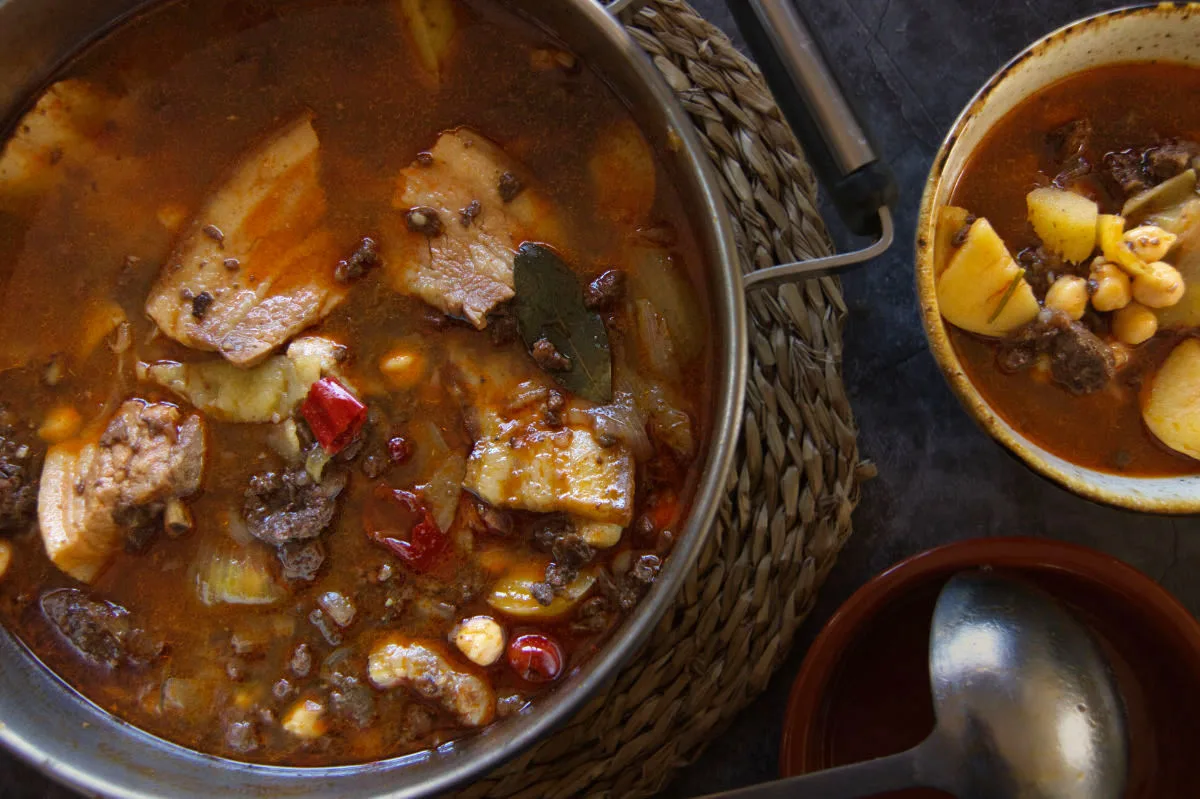
Spicy Spanish-Style Pork Stew is an easy-to-make one-pot recipe that combines various cuts of pork and sausage with Spanish smoked paprika and plenty of chilies for a delicious warming recipe perfect for serving the masses.
This pork stew recipe can be made in around an hour, however, it is best left to bubble away on the stovetop for a few hours and let the meat and flavors soak up all the spicy goodness. It’s a favorite cold weather recipe, cooked over a lazy afternoon where the stew can slowly simmer and release its delicious aroma. It can also be easily made in a slow cooker or crock pot for around eight hours.
Best served with lots of fresh bread, this recipe makes a hearty meat stew that easily serves 4 with plenty of leftovers to enjoy a second helping!
Meat & Poultry Recipes | Main Meal Recipe | Authentic Spanish Recipe | Winter Recipe | Spicy Recipe | High in Protein | Pork and Chorizo | Mediterranean Recipe | Mediterranean Stew
This post may contain affiliate links.
Serving:
Main for 4
Ready in:
~2 hours
Skill level:
Easy
Serve with:
Side dish, or bread
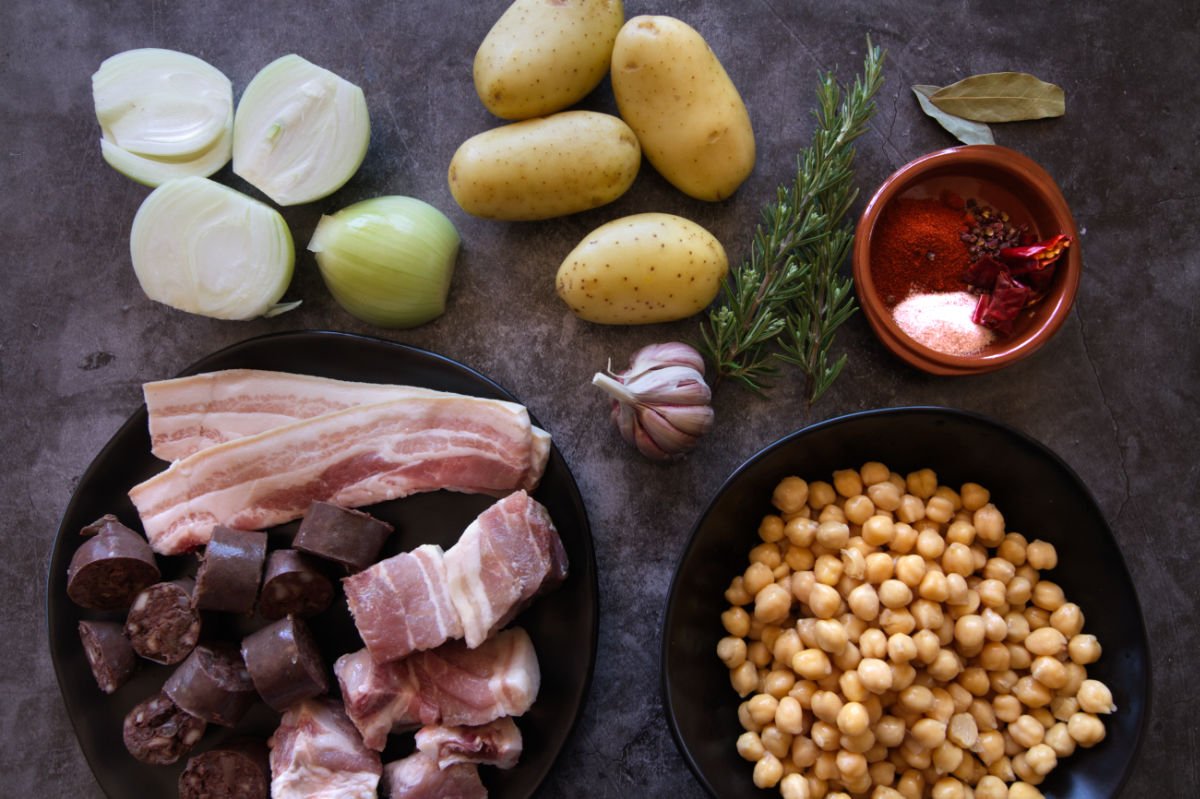
How to Make Spicy Spanish-Style Pork Stew
Ingredients you’ll need
- 33 fl oz (1 liter) of chicken stock (homemade or store-bought)
- 2 blood sausages (approx 3.5oz /100g), chopped into 1-inch (2.5cm) pieces
- 3.5 oz. (100g) pancetta (or thick-cut bacon)
- 5 oz. (150g) pork belly
- 1 head garlic, whole, outer skin removed
- 2 onions, brown husk/skin removed
- 4 medium-sized white potatoes, diced into 1-inch (2.5cm) pieces
- 14oz (400g) cooked chickpeas, or other large white beans
- 1 heaped teaspoon of Spanish La Vera smoked paprika
- 1 teaspoon of salt
- 2 sprigs of fresh rosemary
- 2 bay leaves (optional)
- 1 tablespoon of chili flakes (or sub for fresh chili)
- 1 tablespoon of Szechuan peppercorns (optional)
- 2 tablespoons of Extra virgin olive oil (Optional)
Equipment needed
- 1 large pot (approx 12 inches/30cm) with deep sides.
- Optional: A potato masher
- Sharp kitchen knife and cutting board
Method
Step 1 – Heat stock
- Prepare or heat your stock.
Step 2 – Form stew
- Add the stock, garlic, onions, meat, and sausages to a large pot and bring everything to a boil.
- Boil for 1-2 minutes and skim the surface if any foam appears (this is the fat from the meat reducing).
- Reduce heat to low and once the pot is simmering, add the oil, bay leaves, Szechuan peppercorns, chili flakes, and smoked paprika. Season with some salt (to taste).
Step 3 – Simmer
- Simmer covered for at least 45 minutes. Add a splash of water every 15-20 minutes to ensure everything is covered with stock.
Step 4 – Remove the meat, onion, and garlic
- Add the chickpeas and simmer for another 15 minutes.
- Remove the bay leaf, garlic, onions, and rosemary sprigs.
Step 5 – Check stew consistency
- The chickpeas should be slightly creamy in consistency. If too watery, mash them in the pot.
Step 6 – Serve
- Ladle some of the chickpeas and liquid from the pot into a bowl. Top with a few pieces of chorizo, a chunk of morcilla, and a few slices of pork belly and pancetta.
- Serve piping hot with plenty of fresh bread.
Note: ‘Broth’ Is a term commonly used in the USA. In other parts of the world, ‘stock’ is a term more commonly used to describe a cooking liquid that is made by simmering down animal bones with vegetables in water. You can find more information in this detailed ‘Broth vs. Stock’ article by Martha Stewart.
If you’re planning to make your own homemade stock for this recipe, check out our homemade chicken stock recipe here.
Watch step-by-step recipe video
If you’re looking for this recipe’s video and many other great recipe ideas, why not check out our Spanish Radish YouTube Channel? We’ve got everything from quick and easy tapas recipes, delicious main meals, and incredible Spanish dessert options too.
Why This Pork Stew is “Spanish-style”
This recipe is an original creation from the Spanish Radish HQ and is called Spanish-style due to the similarities in cooking this stew with a traditional fabada (you can check out our authentic Fabada Asturiana recipe here).
There are also plenty of similarities in the pork stew recipes found in the Andalusia region of southern Spain. This traditional recipe is very old and has evolved over time as tastes change, however, the recipe always included some type of legumes (white beans or chickpeas usually), some kind of meat, vegetables, and a variety of local herbs (thyme, bay leaves, and rosemary).
Spanish Fabada
What is ‘Fabada’ you may ask?
A fabada is a heavy and hearty dish that hails from the Northern Spanish region called Asturias. It is a rich stew that is made with hunks of pork, pork sausages such as chorizo and morcilla, and large white beans (called ‘fabes’ in Spanish) that resemble something similar to a large broad bean.
Discover more cuisine from the Asturias region with our Asturias regional foodie guide
Spanish-style pork stew
This pork stew recipe uses similar ingredients and the same cooking method as a fabada, only it adds some chili food a spicy flavor kick. This pork stew is super easy to make, simply add everything to a large pot, and simmer until the meat softens and absorbs the spices and other flavors in the pot.
A traditional Spanish fabada gently simmers away for hours, however, this recipe can be made in around an hour with no sacrifice to flavor.
Best Pork to Use for Pork Stew
Use a few different fatty cuts of pork to really layer the flavors. Lean pork cuts won’t soften up as well when stewed so anything with a high fat content is best for this recipe.
Suggested pork cuts:
- Pancetta
- Bacon (strips or chunks)
- Morcilla or blood sausage
- Fresh chorizo sausage
- Pork belly
Herbs and Spices Used
This recipe has a delicious mild spice to it which can be easily enhanced to suit your own taste. We layer the spice flavor by using a few different types of spice: dried chili, Spanish La Vera smoked paprika and Szechuan peppercorns.
Dried chili
Easy to source from any grocer or supermarket, dried chili flakes are an easy way to add spice to any recipe! Dried chili (like fresh chili) comes in a variety of different heat strengths, so be sure to check the labeling of your dried chili before use.
We add a tablespoon of dried chili which is considered moderately spicy. It adds a kick of heat to the recipe without overwhelming the rest of the flavors in the recipe. If something more spicy is your thing, then consider using fresh chilies such as Jalapeño or Birdseye chilies.
- Jalapeño pepper: Typically ranges from 2,500 to 8,000 SHU, considered mild to moderately spicy
- Birdseye chili: They typically have a Scoville Heat Unit (SHU) rating of 50,000 to 100,000. Most will agree they offer a good spicy kick that lingers.
Smoked paprika
We used Pimentón de La Vera which is a type of Spanish smoked paprika renowned in Spain for giving recipes a rich smoky flavor. We highly recommend this type of smoked paprika over other types, trust us, you’ll really notice the difference in flavor!
Szechuan peppercorns
Szechuan peppercorns, also spelled as Sichuan peppercorns, are native to the Sichuan (Szechuan) province of China and are not something always associated with Spanish cuisine. We opted for Szechuan peppercorns as they have a unique citrusy and numbing flavor, and add another layer of spice without overwhelming the rest of the herbs and spices used.
If you can’t source Szechuan peppercorns, use cayenne pepper (around 1/2 teaspoon would be plenty).
Spicy Recipe Suggestions
Looking for more spicy recipes? Check out these recipes!
- Spicy Mediterranean Chicken Thighs
- Spanish Chicken In Smoky Bravas Sauce (Spicy Recipe)
- Mediterranean Boneless Chicken Thighs Simmered In Tomato Sofrito And Spicy Paprika
- Spicy grilled shrimp with tangy peach salad
- Pan-Fried Spicy Shrimp with Romesco Sauce (20-min tapas)
- Spicy chicken and chorizo rice
- Papas arrugadas with mojo verde and a spicy mojo picón
- Spicy Patatas Bravas
- Spicy Spanish pumpkin soup with paprika oil & chorizo
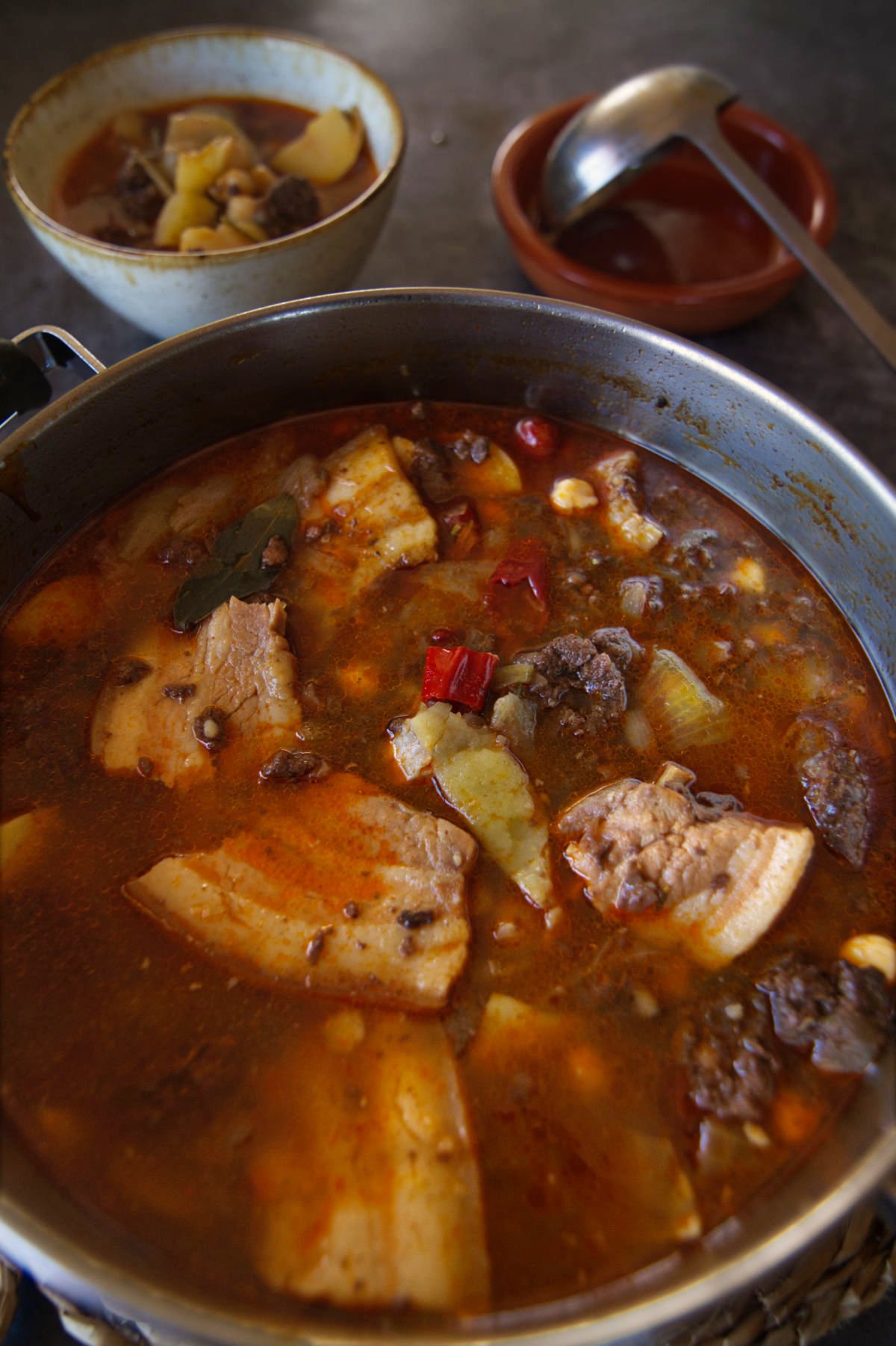
Cook This Pork Stew in a Crock Pot
Come the turn to cooler weather, we all crave easy, flavorsome comfort food and the humble crock pot (also known as a slow cooker) becomes that one essential piece of kit.
A crock pot allows you to set and forget and requires little attention as your meal simmers away for several hours. If you’re planning on using a crock pot to cook this recipe, follow the instructions below:
How to Cook Pork Stew in a Crock Pot (Slow Cooker)
- Heat the stock in a saucepan on the stovetop. Once boiling, reduce heat to a simmer and add the spices, bay leaves, and some salt (to taste).
- Brown the meat (pancetta, sausage, pork chunks) and cook the onion until golden in a skillet with a splash of olive oil.
- Add the onion to the crock pot and top with the browned pork, the cubed potatoes, and chickpeas.
- Add enough stock to completely cover all ingredients in the pot, then add the chili and sprigs of rosemary.
- Cover the pot and cook on low for around 8 hours or until the pork is tender (you should notice any on-bone pieces of pork will fall off the bone).
- Season to taste and serve.
FAQs
How long does this pork stew recipe take to make?
- Prep time: 5 minutes
- Cook time: 1 hour
- Total time: 1 hour, 5 minutes
What are the best cuts of pork to use for this stew?
Use fatty cuts of pork such as shoulder meat, pork belly, blood sausage (morcilla in Spanish), pancetta, or bacon. Spanish chorizo can also be used.
Can this pork stew be made in a slow cooker (crock pot)?
Yep, it sure can! Pork stews work well in a slow cooker as the meat has plenty of time to render down and release the fats and flavor into the stew. Check the above article text for more detailed instructions on how to make this pork stew in a crock pot.
How to store pork stew leftovers
Store any leftovers in an airtight container in the fridge for up to 3 days. Pork stew can be frozen in airtight containers or freezer bags and will keep for up to 3 months when frozen. To reheat, thaw and then simmer on the stovetop or reheat in a microwave.
Nutrition Facts
| Serving size: 250g | |
| Servings: 4 | |
| Amount per serving | |
| Calories | 806 |
| % Daily Value* | |
| Total Fat 39.3g | 50% |
| Saturated Fat 13.1g | 66% |
| Cholesterol 106mg | 35% |
| Sodium 2370mg | 103% |
| Total Carbohydrate 71.2g | 26% |
| Dietary Fiber 12.1g | 43% |
| Total Sugars 5.4g | |
| Protein 42.8g | |
| Vitamin D 0mcg | 0% |
| Calcium 133mg | 10% |
| Iron 6mg | 31% |
| Potassium 1248mg | 27% |
| *The % Daily Value (DV) tells you how much a nutrient in a food serving contributes to a daily diet. 2,000 calorie a day is used for general nutrition advice. | |
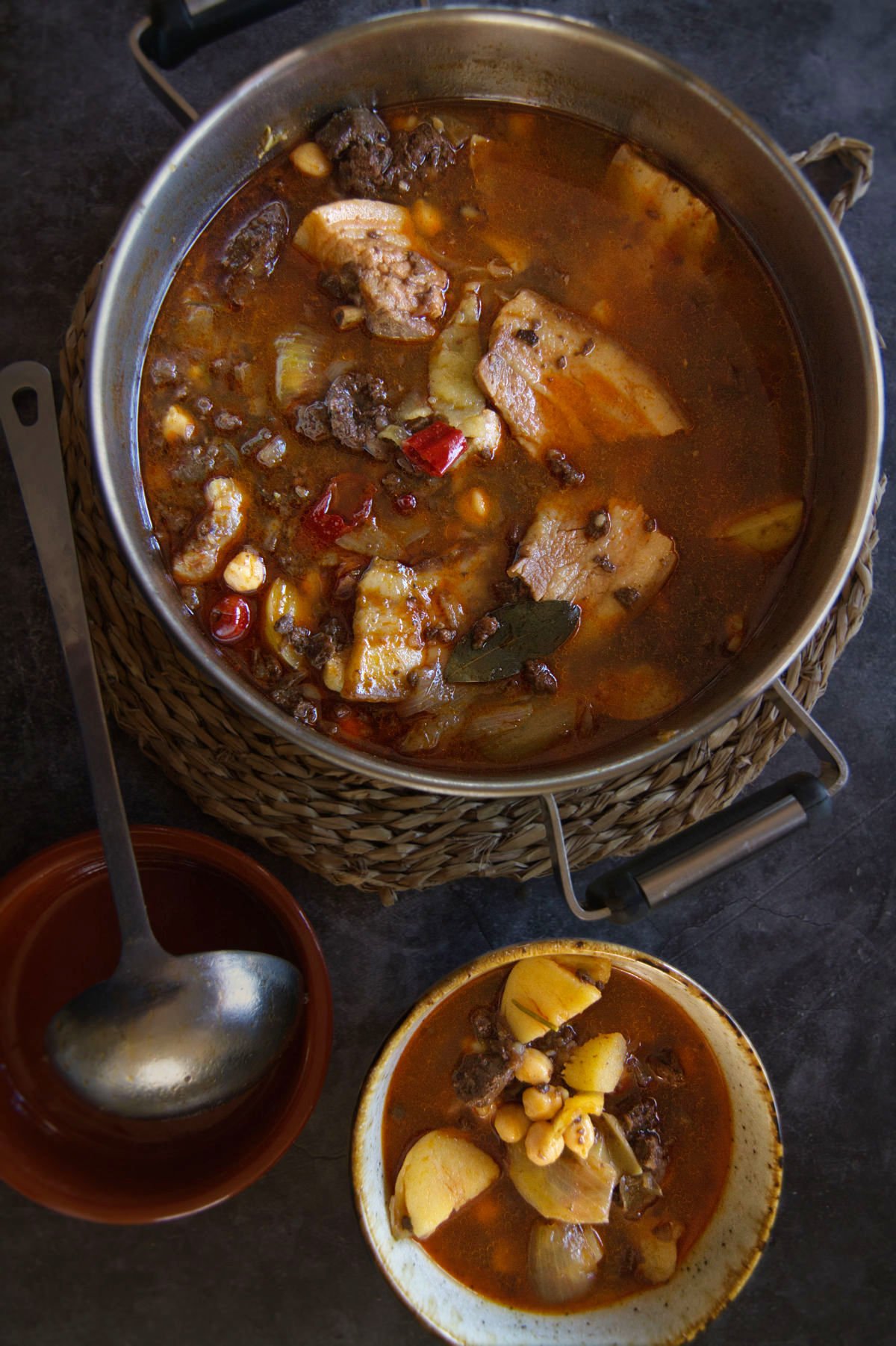
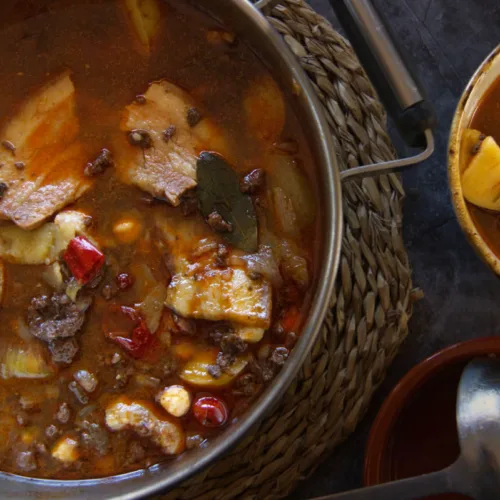
Spicy Spanish-Style Pork Stew (Super Easy, Filling, One-Pot Recipe)
Equipment
- 1 large pot (approx 12 inches/30cm) with deep sides.
- Optional: A potato masher
- Sharp kitchen knife and Cutting board
Ingredients
- 33 fl oz 1 liter of chicken stock (homemade or store-bought)
- 2 blood sausages approx 3.5oz /100g, chopped into 1-inch (2.5cm) pieces
- 3.5 oz. 100g pancetta (or thick-cut bacon)
- 5 oz. 150g pork belly
- 1 head garlic whole, outer skin removed
- 2 onions brown husk/skin removed
- 4 medium-sized white potatoes diced into 1-inch (2.5cm) pieces
- 14 oz 400g cooked chickpeas, or other large white beans
- 1 heaped teaspoon of Spanish La Vera smoked paprika
- 1 teaspoon of salt
- 2 sprigs of fresh rosemary
- 2 bay leaves optional
- 1 tablespoon of chili flakes or sub for fresh chili
- 1 tablespoon of Szechuan peppercorns optional
- 2 tablespoons of Extra virgin olive oil Optional
Instructions
Step 1 – Heat stock
- Prepare or heat your stock.
Step 2 – Form stew
- Add the stock, garlic, onions, meat, and sausages to a large pot and bring everything to a boil.
- Boil for 1-2 minutes and skim the surface if any foam appears (this is the fat from the meat reducing).
- Reduce heat to low and once the pot is simmering, add the oil, bay leaves, Szechuan peppercorns, chili flakes, and smoked paprika. Season with some salt (to taste).
Step 3 – Simmer
- Simmer covered for at least 45 minutes. Add a splash of water every 15-20 minutes to ensure everything is covered with stock.
Step 4 – Remove the meat, onion, and garlic
- Add the chickpeas and simmer for another 15 minutes.
- Remove the bay leaf, garlic, onions, and rosemary sprigs.
Step 5 – Check stew consistency
- The chickpeas should be slightly creamy in consistency. If too watery, mash them in the pot.
Step 6 – Serve
- Ladle some of the chickpeas and liquid from the pot into a bowl. Top with a few pieces of chorizo, a chunk of morcilla, and a few slices of pork belly and pancetta. Serve piping hot with plenty of fresh bread.

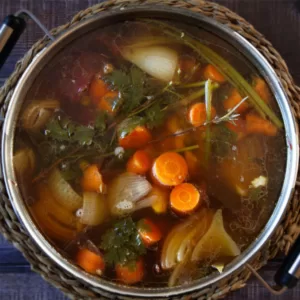
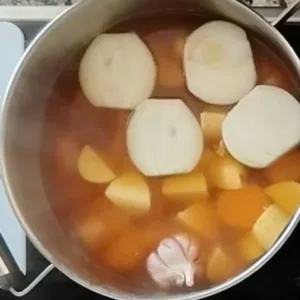
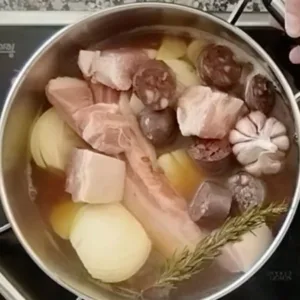
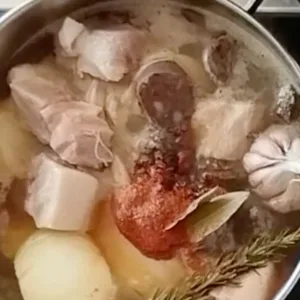
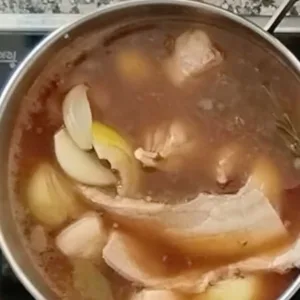

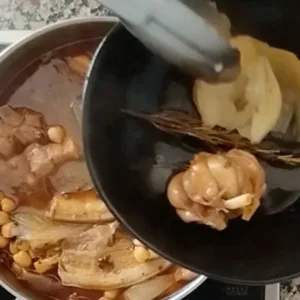
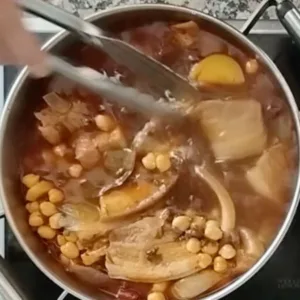
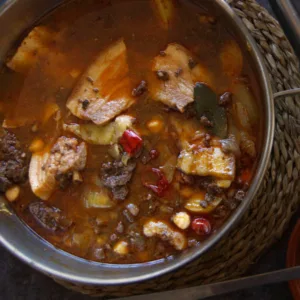
0 Comments